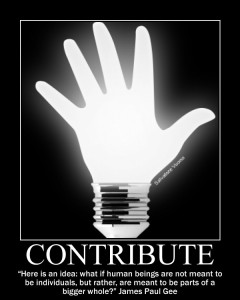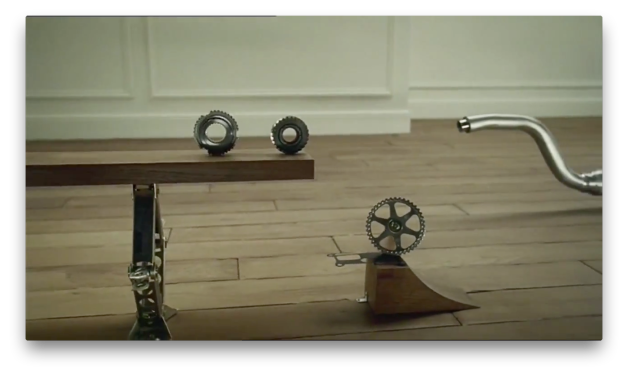The Anti- Education Era:
Creating Smarter Students through Digital Learning
By: James Paul Gee
A closer look at Chapters 17 - 19
Big Questions:
- How can, WE, globally use the tools we have to work together to solve wicked problems without judgement of ideas or others?
- How does inequality affect education?
- What creates inequality? How do we solve inequality?
These three chapters of Gee focus on the inequality in society that leads to inequality in the classroom. Your lesson this week takes a deeper look at this issue and asks us to look towards solutions.
Why are humans so stupid when they should be smarter? Another way of putting this question is: how can, WE, globally use the tools we have to work together to solve wicked problems without judgement of ideas or others? Watch the commercial below. As you watch the commercial, The Cog, keep in mind how the parts are working together to power something larger.
Plenty of thought, time, and effort went into the making of this commercial. Think about all of the parts it took to create the commercial. How did all of the parts contribute to making the whole cog work? If one part is missing the whole cog does not work, but with thought and the right tools it could be restructured to still have a working cog as the end result. According to Gee, WE are one world and we are made up of many different countries, cultures, values, beliefs, passions, prejudices, and religions (think about the many different components of the cog). Currently, all of these things work independently rather than together. Gee posed this idea, “what if human beings are not meant to be individuals, but rather, are meant to be parts of a bigger whole?” (152) How, then, do we get everyone to work together? How we do begin to bridge the inequality gap? Let’s look at this idea of inequality a bit further...
Go through the TEDed lesson below to explore the issues of inequality in today’s society further:
PLEASE FOLLOW THIS PART OF THE PRESENTATION AT http://ed.ted.com/on/JfCkz59b
In chapter 17, Gee (2013) argues that status is determined more by health than by wealth. High inequality has an effect on the health of people in society. A person in a low inequality country will have better health than an equally wealthy person in a high inequality county, no matter the wealth level. Watch the video, pay particular attention to between 9:00 and 15:00.
www.youtube.com/embed/hVimVzgtD6w?rel=0t=9m00s
Rosling says, "Health cannot be bought at a supermarket." (13:25). The CDC released a report in 2011 titles Health Disparities and Inequalities Report detailing the effects of inequality on health. Figure 4 is a great representation of this. A common measure of income inequality is the Gini coefficient, which is used in the CDC report. Utah has the least inequality of all the states, and the best average healthy days. West Virginia has the most inequality and the least number of average healthy days. There is a strong correlation between average healthy days and inequality. Now, take some time to play with the same data that Rosling was using. He used Child Survival vs. GDP per capita. How does that data compare to Life Expectancy vs. GDP per capita? How does health change when compared to inequality? Also look at GDP vs. Inequality.
Gee (2013) argues that societies with low inequalities are better off, top to bottom, than societies with high inequalities, regardless of wealth. To quote him, "Our problems in education are not rooted primarily in our schools, no matter how bad or how good some of them are, but in our society." So it seems the teacher's job is to not only teach reading, writing, and arithmetic, but also to educate a society to work together for more equality.
Please share your thoughts on Twitter with the hashtag #geechat
Gee, J. P. (2013). The anti-education era: Creating smarter students through digital learning (pp. 151-158). New York: Palgrave Macmillan.
Centers for Disease Control and Prevention. CDC Health Disparities and Inequalities Report – United States, 2011. MMWR 2011;60(Suppl).
Rosling, H. (2006, February). Hans Rosling: Stats that reshape your world-view [Video file]. Retrieved from http://www.youtube.com/watch?v=hVimVzgtD6w
CONTINUE HERE.
 Many educational reforms have been implemented in schools to improve the performance of poor and minority students however, the educational gaps between rich and poor remain. It is the high inequality in a society that creates deep divides in educational success. We need to address this inequality and make people feel like they count, like they are a contributing member of society. They need to matter.
Many educational reforms have been implemented in schools to improve the performance of poor and minority students however, the educational gaps between rich and poor remain. It is the high inequality in a society that creates deep divides in educational success. We need to address this inequality and make people feel like they count, like they are a contributing member of society. They need to matter.
Inequality affects education because it is one place where kids from all income levels are included. Schools offer a place to bring communities together and to work to bridge gaps in our society. Schools can be a place to teach collaboration and teach the importance of being a pro-active global citizen: thinking in the WE not the I. What can WE do to help - it is the students of today that are going to be creating the solutions for tomorrow, as teachers, let’s help guide them in that journey. Humans are not smart alone. “Minds linked to other Minds to form a large interacting network of Minds can wage vast war or save vast numbers of lives in public health interventions. What Minds do is determined by some vision of what is good, right, or necessary.” Gee (p 167)
Together we are smarter.

There can be no equality or opportunity if men and women and children be not shielded in their lives from the consequences of great industrial and social processes which they cannot alter, control, or singly cope with.
--Woodrow Wilson
As you think about these questions share your thoughts on twitter using #maetel1 and #geechat.Here are the values that I stand for: honesty, equality, kindness, compassion, treating people the way you want to be treated and helping those in need. To me, those are traditional values.
--Ellen DeGeneres



Nice job! Very cool.
ReplyDeleteI LOVE your TED talk. Such a different perspective, yet so familiar!
ReplyDeleteIt think the TED-Ed platform is pretty awesome. I that's what I'm going to use this year to flip the classroom.
ReplyDelete